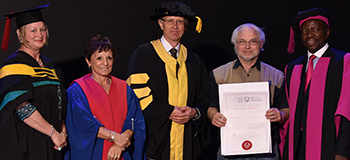Latest News Archive
Please select Category, Year, and then Month to display items
![]()
The Centre for Gender and Africa Studies (CGAS) and the UFS will host an Africa Day Webinar on the topic, Reflections on Africa amidst Covid-19, to be delivered by Prof. Sabelo J. Ndlovu-Gatsheni, renowned decolonial scholar. The title of his lecture is Revisiting the African idea of Africa during the moment of Covid-19 pandemic.
The crisis delivered by Coronavirus and Covid-19 invites Africans to rethink and even unthink the long-standing dependency on Europe and North America for help. What has dawned on Africa is the equally long-standing aspiration of self-reliance. What is emerging is a new African idea of Africa which takes responsibility for its own challenges. This new African idea of Africa challenges the Mudimbean idea of Africa embodied in the colonial library.
Thus this presentation reassesses how Africa has relied on its own historical experience, its own knowledge, and own people to confront Covid-19. What is of interest here is the proverbial wisdom of necessity being the source of invention. The presentation brings to the fore the decolonial turn as it gestures beyond crisis into post-Covid-19 world order. It ends with a call for decolonial love founded on new ethics of living together and new economies of care.
Bio of Prof Sabelo J. Ndlovu-Gatshen
Date: Tuesday, 26 May, 2020
Time: 14:00
Duration: 90 min max (45 min talk, 45 min Q&A)
The webinar can be accessed via one of the following links:
OR
Community builders honoured at Community Engagement Awards
2016-10-13

Photo: Charl Devenish
The office of Community Engagement held its annual Community Engagement Awards at the University of the Free State (UFS) on 5 October 2016. This year, the ceremony celebrated people who gave themselves selflessly to improve the lives of those around them who are less privileged. Key players in various sectors of society were recognised and honoured for their contribution and commitment towards a common good.
Dr Richard Teare, president of the Global University for Lifelong Learning (GULL), was the keynote speaker at the ceremony. GULL, a non-profit foundation, operates across the world, providing access to lifelong learning for communities, giving each individual an opportunity to make a difference in their world. Dr Teare talked of places that lack the provision and infrastructure to access higher education and said that through community service programmes, social and economic development was enhanced, and the necessary expertise and resources were provided to drive a community towards a greater good. “Community engagement espouses academic excellence—it enables people to discover their full potential.”
Through its partnership with GULL, the University of Free State has worked with women from Bloem Shelter, an organisation that provides assistance to underprivileged women and children from diverse walks of life. The women were equipped with the necessary skills and knowledge they needed to become self-sufficient - an experience that has yielded positive, constructive change in the women’s lives.
The awards also acknowledged the boldness and innovative support of members of the Free State community in their various sectors. Among those awarded was Dr Choice Makhetha for her contribution in building capacity for those involved in community service programmes. She also designed and created approaches to improve situations in schools, churches, community organisations and small businesses. Also presented with an award was Dr Dipane Hlalele of the Qwaqwa Campus for his role as principal investigator in two National Research Foundation (NRF) -funded projects; Rural Relational Leadership and Sustainable Rural and Urban Connection. The ICT Innovation in School Education division of the South Campus was also recognised for its Internet Broadcast Project (IBP), which provides lessons on different subjects to 72 000 learners and 3 000 teachers each week.